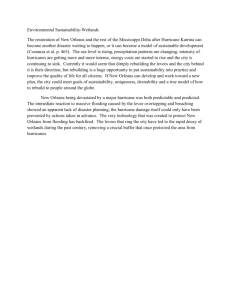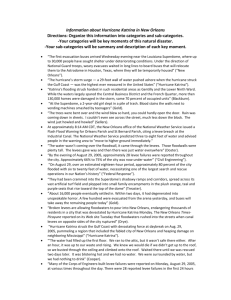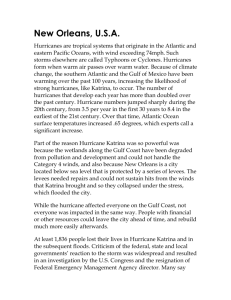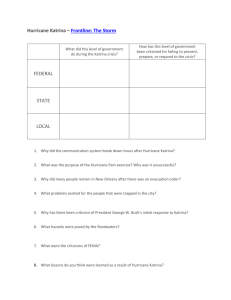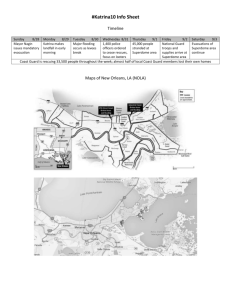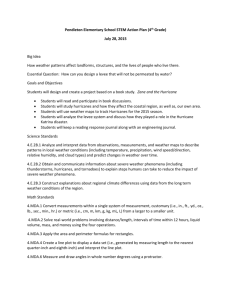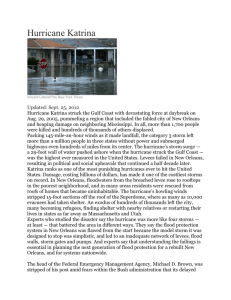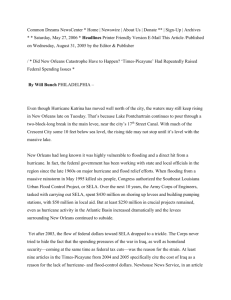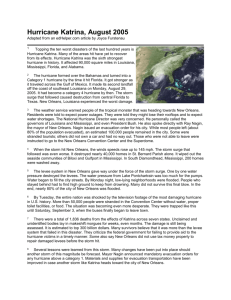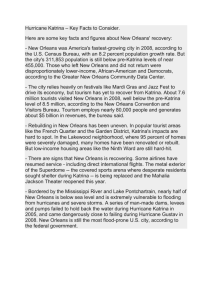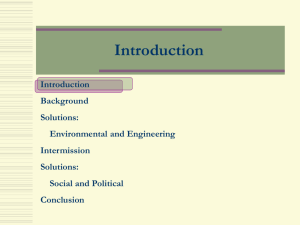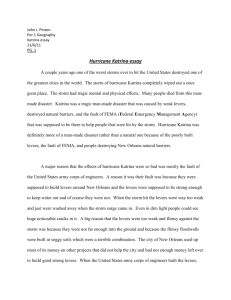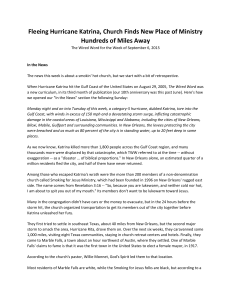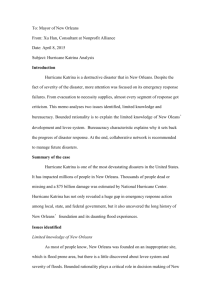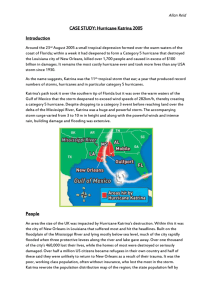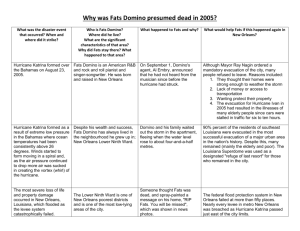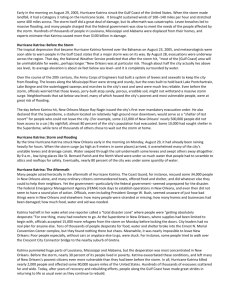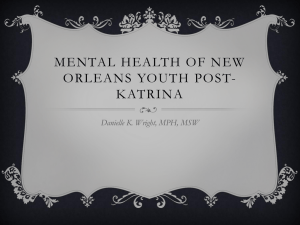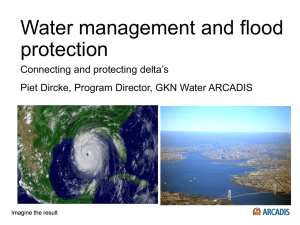KatrinaCaseStudy
advertisement
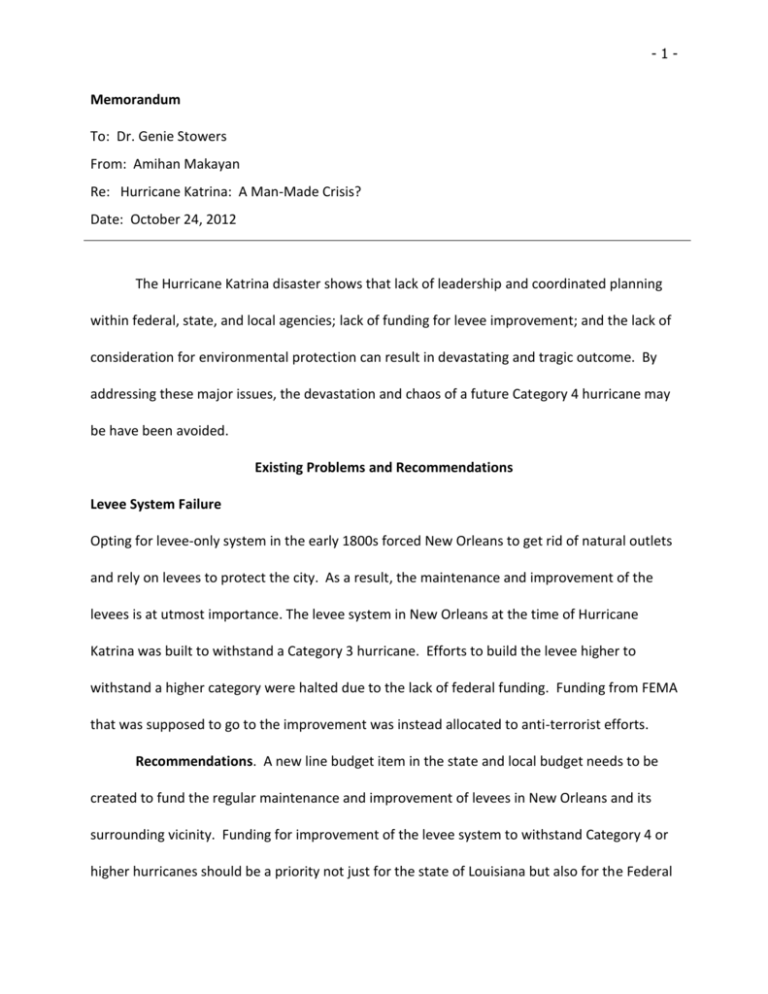
-1- Memorandum To: Dr. Genie Stowers From: Amihan Makayan Re: Hurricane Katrina: A Man-Made Crisis? Date: October 24, 2012 The Hurricane Katrina disaster shows that lack of leadership and coordinated planning within federal, state, and local agencies; lack of funding for levee improvement; and the lack of consideration for environmental protection can result in devastating and tragic outcome. By addressing these major issues, the devastation and chaos of a future Category 4 hurricane may be have been avoided. Existing Problems and Recommendations Levee System Failure Opting for levee-only system in the early 1800s forced New Orleans to get rid of natural outlets and rely on levees to protect the city. As a result, the maintenance and improvement of the levees is at utmost importance. The levee system in New Orleans at the time of Hurricane Katrina was built to withstand a Category 3 hurricane. Efforts to build the levee higher to withstand a higher category were halted due to the lack of federal funding. Funding from FEMA that was supposed to go to the improvement was instead allocated to anti-terrorist efforts. Recommendations. A new line budget item in the state and local budget needs to be created to fund the regular maintenance and improvement of levees in New Orleans and its surrounding vicinity. Funding for improvement of the levee system to withstand Category 4 or higher hurricanes should be a priority not just for the state of Louisiana but also for the Federal -2- government. It is recommended that FEMA be removed from the Department of Homeland Security and be its own agency. It is important the FEMA focus its resources on emergencies and not political priorities like anti-terrorist programs. “Administration lies outside the proper sphere of politics (Wilson, 1887).” Lack of Leadership and Poor Coordination The lack leadership and proper coordination at the federal, state, and local levels slowed down the process of evacuations, providing security in the city, and providing services to the people affected by the hurricane. Woodrow Wilson said that one of the challenge of democracy as compared to a monarchy, is that in a monarchy, there is one decision maker, in a democracy, there are multiple and differing opinions to consider (1887). In a catastrophe, it is necessary to have a single decision maker who will ensure good communication and coordination between stakeholders. During Katrina, “no one person was in charge of coordinating efforts.” FEMA, should have been the one to coordinate all the efforts, but because of 9/11, it became part of Homeland Security and redirected its efforts away from emergencies and into terrorist activities. Recommendation. Because hurricanes are a normal occurrence in New Orleans, better preparation for a Category 4 or 5 hurricanes is needed. It is recommended that a coordination group solely focused on addressing future hurricane disasters in New Orleans and its vicinity be formed. The Governor of Louisiana will be in charge and its members will comprise of the Head of FEMA and his/her designee, a representative from the National Guard, the Mayor of New Orleans, and the Police Chief. It is also recommended that disaster and emergency relief focused non-profit organization executives be invited to the meeting in order to assure that -3- future volunteers and the community are included in the plan. The group will meet once a year in the summer to discuss roles, emergency plans in place, and review coordination efforts. Contingency plans should also be reviewed and revised in coordination with all the members of the group. An annual emergency drill for all agencies should also be scheduled regularly to make sure that processes would work in a real emergency. Environmental Issues-Wetlands and Overdevelopment The creation of levees caused a significant loss of wetlands which act as a barrier for the city. Wetlands get its “supply of sediments and nutrients” from spring floods which the levees restrain. Urbanization and industrialization also resulted in more loss, as wetlands and coastline were dredged to make way for progress and housing. According to the case, “The city continues to lose an acre of wetland every 24 minutes.” Recommendation. It is recommended that the state of Louisiana stop further development and dredging of its wetlands. Furthermore, some areas with wetlands should be reclaimed for future wetlands restoration with an ultimate goal of getting back the 1,900 square miles it has lost since the 1930s. A reclamation district agency needs to be established to manage the efforts. The agency will work in identifying areas to reclaim as well as coordinate relocation needs. No new building permits for new housing will be allowed in wetland areas. Conclusion Hurricane Katrina was one of the costliest and deadliest natural disasters in the U.S. Its tragic outcome could have been lessened with better levee funding, better interagency coordination and leadership, and a commitment to improve New Orleans environments. -4- Reference List Wilson, Woodrow (1887). The Study of Administration. Political Science Quarterly, 2(2), 197222.
